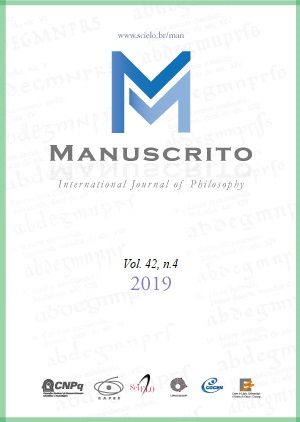Resumo
Aristotle contrasts episteme and doxa through the key notions of universal and necessary. These notions have played a central role in Aristotle’s characterization of scientific knowledge in the previous chapters of APo. They are not spelled out in APo I.33, but work as a sort of reminder that packs an adequate characterization of scientific knowledge and thereby gives a highly specified context for Aristotle’s contrast between episteme and doxa. I will try to show that this context introduces a contrast in terms of explanatory claims: on the one hand, episteme covers those claims which capture explanatory connections that are universal and necessary and thereby deliver scientific understanding; on the other hand, doxa covers the explanatory attempts that fail at doing so.
Referências
ACKRILL, J. L. Categories and De interpretatione: translation and notes. Oxford: Clarendon, 1963.
ALMEIDA, W. D. “Termos Singulares, Transcategoriais e Summa Genera na Lógica de Aristóteles”. Manuscrito 36 (1): 5-48, 2013.
ANGIONI, L. Introdução à Teoria da Predicação em Aristóteles. Campinas: Editora Unicamp, 2006.
ANGIONI, L. “Aristóteles e a noção de sujeito de predicação (Segundos Analíticos I 22, 83a 1-14)”. Philosophos 12 (2): 107-129, 2007.
ANGIONI, L. “Aristotle on Necessary Principles and on Explaining X through X’s essence”. Studia Philosophica Estonica 7(2): 88-112, 2014.
ANGIONI, L. “Aristotle’s definition of scientific knowledge (APo71b9-12)”. Logical Analysis and History of Philosophy 19: 79-105, 2016.
AQUINAS, T. Expositio libri Posteriorum Analyticorum. In: Larcher, F.R. (tr.) Thomas Aquinas. Commentary on the Posterior Analytics of Aristotle, Albany, NY: Magi Books, 1970.
BARNES, J. Aristotle: Posterior Analytics. 2nd edition. Oxford: Clarendon Press, 1993. Avoiding Infinite Regress 154 Manuscrito – Rev. Int. Fil. Campinas, v. 42, n. 4, pp. 122-156, Oct-Dec. 2019.
BOGEN, J. & MCGUIRE, J. (eds.) How things are: Studies in predication and the history of philosophy and science. Dordrecht: Reidel, 1985.
BURNYEAT, M. “Aristotle on Understanding Knowledge”. In: Berti, E. Aristotle on Science: The Posterior Analytics, Proceedings of the Eighth Symposium Aristotelicum (pp. 97- 139). Padova: Editrice Antenore, 1981.
CODE, A. (1985) “On the origins of some Aristotelian theses about predication”. In: Bogen, J. & McGuire, J. (eds.) How things are: Studies in predication and the history of philosophy and Science (pp. 101-131). Dordrecht: Reidel.
CRAGER, A. Meta-logic in Aristotle’s Epistemology. PhD diss., Princeton University, 2015.
DEMOS, R. “The structure of substance according to Aristotle”. Philosophy and Phenomenological 5 (2): 255- 268, 1944.
FEREJOHN, M. The Origins of Aristotelian Science. New Haven: Yale University Press, 1991.
FEREJOHN, M. Formal Causes: Definition, Explanation, and Primacy in Socratic and Aristotelian Thought. Oxford: Oxford University Press, 2013.
FURTH, M. Substance, Form and Psyche: An Aristotelian Metaphysics. Cambridge: Cambridge University Press, 1988.
HAMLYN, D.W. “Aristotle on Predication”. Phronesis 6 (2): 110-12, 1961.
KOSMAN, L. “Understanding, Explanation, and Insight in the Posterior Analytics”. In: Lee, E.N. Mourelatos, A.P.D. & Rorty, R.M. (eds.) Exegesis and Argument, Studies in Greek Philosophy presented to Gregory Vlastos. New York: Humanities Press, 1973.
LEAR, J. Aristotle and Logical Theory. Cambridge: Cambridge University Press, 1980.
LENNOX, J. G. “Divide and Explain: The Posterior Analytics in Practice”. In: Gotthelf, A. & Lennox, J.G. (eds.) Philosophical Issues in Aristotle’s Biology (pp. 90-119). Cambridge: Cambridge University Press, 1987.
LEWIS, F. “Form and Predication in Aristotle’s Metaphysics”. In: Bogen, J. & McGuire, J. (eds.) How things are: Studies in predication and the history of philosophy and Science (pp. 59-83). Dordrecht: Reidel, 1985.
LEWIS, F. Substance and Predication in Aristotle. Cambridge: Cambridge University Press, 1991.
LOUX, M. Primary Ousia: An Essay on Aristotle’s Metaphysics Z and H. Ithaca: Cornell University Press, 1991.
MALINK, M. Aristotle’s Modal Syllogistic. Cambridge, MA: Harvard University Press, 2013.
PERAMATZIS, M. “Essence and Per Se Predication in Aristotle’s Metaphysics Z.4”. Oxford Studies in Ancient Philosophy 39: 121-182, 2010.
PHILOPONUS. In Aristotelis Analytica Posteriora Commentaria. In: Wallies, M. (ed.) Commentaria in Aristotelem Graeca. Voluminis XIII. Pars III - Ioannis Philoponi in Aristotelis analytica posteriora commentaria cum anonymo in librum II. Berlin: G. Reimer, 1909.
QUINE, W.V.O. Word and object. Cambridge, MA: MIT Press, 1960.
ROSS, D. Aristotle’s Prior and Posterior Analytics: A Revised Text with Introduction and Commentary. Oxford: Clarendon Press, 1949.
SCANLAN, M. “On finding compactness in Aristotle”. History and Philosophy of Logic 4 (1&2): 1-8, 1983.
SMITH, R. “The Relationship of Aristotle’s Two Analytics”. The Classical Quarterly, New Series 32 (2): 327-335, 1982.
SMITH, R. “Immediate Propositions and Aristotle’s Proof Theory” Ancient Philosophy 6: 47- 68, 1986.
STRIKER, G. Aristotle: Prior Analytics Book I. Translated with an introduction and commentary. Oxford: Clarendon Press, 2009.
TAYLOR, C. C. “Aristotle’s Epistemology”. In: Everson, S. (ed.) Epistemology: Companions to Ancient Thought (Vol. I, pp. 116-142). Cambridge: Cambridge University Press, 1990.
ZUPPOLINI, B. “Forma Lógica das Proposições Científicas e Ontologia da Predicação: um falso dilema nos Segundos Analíticos de Aristóteles.” Philósophos, 19 (2): 11-45, 2014.
ZUPPOLINI, B. Ontological Underpinnings of Aristotle’s Philosophy of Science. PhD diss., University of Campinas, 2017.
ZUPPOLINI, B. “Aristotle on Per se Accidents.” Ancient Philosophy 38: 113–35, 2018.
ZUPPOLINI, B. (forthcoming) “Comprehension, Demonstration, and Accuracy in Aristotle”. Journal of the History of Philosophy.


